
7 minute read
Using Evidence as a Framework for Success. Chiropractic Australia National Conference 2019
Using Evidence as a Framework for Success. Chiropractic Australia National Conference 2019
By: Amber Beynon B.Sc. (Hons), B.Chiro
Advertisement
This year’s conference was held on Queensland’s Gold Coast, which proved to be a popular location to listen to some incredible presentations.
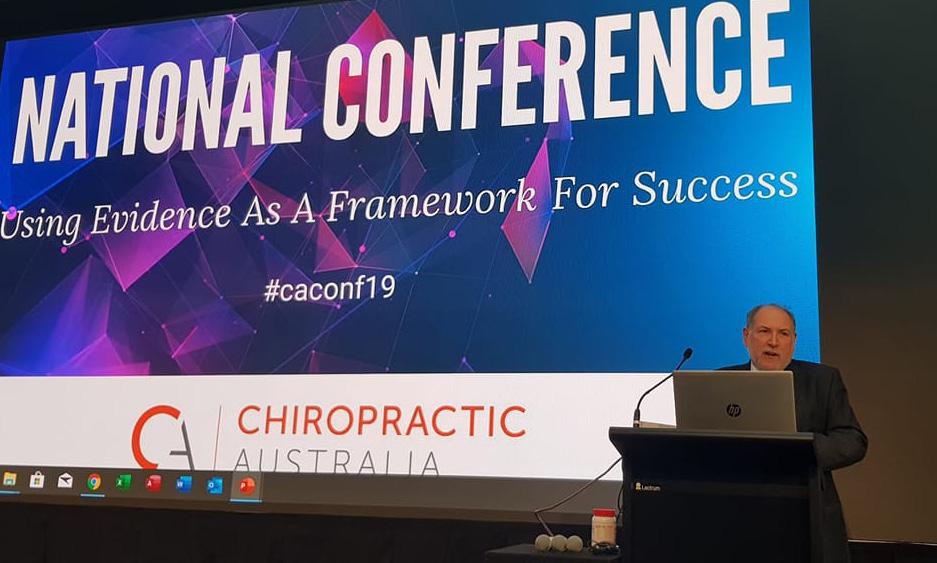
CA President Rod Bonello officially opens Conference 2019
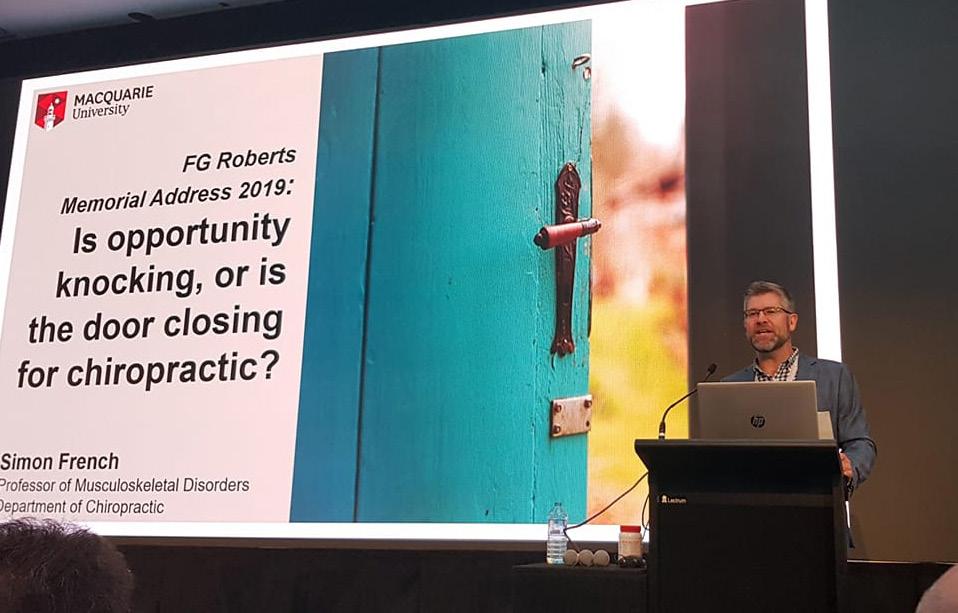
Professor Simon French delivers the FG Roberts address
After CA President Rod Bonello formally opened the conference and welcomed delegates, Professor Simon French took the podium for the FG Roberts Address in which he posed the question; “Is opportunity knocking, or is the door closing for chiropractic?” Reflecting on the growing recognition of the economic impact of spinal pain and that most guidelines routinely include SMT in their recommendations, Professor French noted that while on one hand this presents a “free kick at goal”, on the other there are recurrent negative media stories about chiropractic which are creating significant barriers and hurdles that appear to be closing doors. Professor French explored the journeys of the chiropractic professions in Canada and Denmark where they have achieved higher patient utilization rates through involvement in research to bring credibility to the profession and break down interdisciplinary barriers. He mused on the need for more resources to support scholarships for PhDs and research projects, and to support career pathways for those who have gained their PhD. “Research is to improve practice. Not to prove practice.” was a noteworthy comment in his talk because in this regard there is a long journey ahead of us.
Next up was the first of our international guests, Professor Dave Newell, from the UK. His first presentation “The Psycho in the room: Is chiropractic care more psychosocial than bio?” was prefaced by him eating a lemon! Why? Well you just had to be there... He unwrapped the finding that differing technique systems in chiropractic (and also psychology) tend to produce similar results and this is due to psychosocial influences such as placebo and contextually aided factors.
Professor Newell was followed by another of our international speakers, Professor Stephen Perle who, having been a guest presenter on several occasions in the past, is no stranger to Australian shores. Professor Perle’s topic, “Technology tools to make using evidence in a busy practice”, introduced us to a range of “Apps” designed to scaffold deep learning i.e., take what you know, compare retained information, be critical, and come up with new answers. Easy!
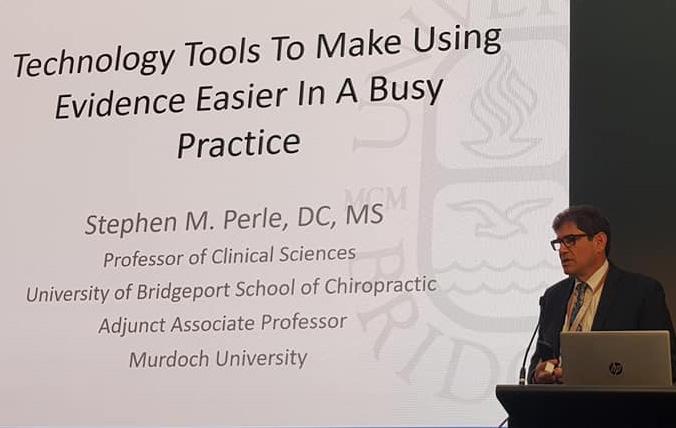
With a Master of Applied Science in Medical Imaging Dr Hazel Jenkins from Macquarie University was well qualified to present “X-ray imaging: When and when not to use it. What does the evidence say?” In presenting the evidence for taking X-rays Hazel mentioned ionizing radiation, however, most of her discussion focused on the many clinical guidelines, AHPRA legislation regarding evidence-based practice, clinical utility, poor screening utility, iatrogenic consequences, over diagnosis, costs to the healthcare system, and many other areas of evidence or areas where evidence is lacking. A world class presentation. (Hazel later announced that she had just been awarded her PhD!)
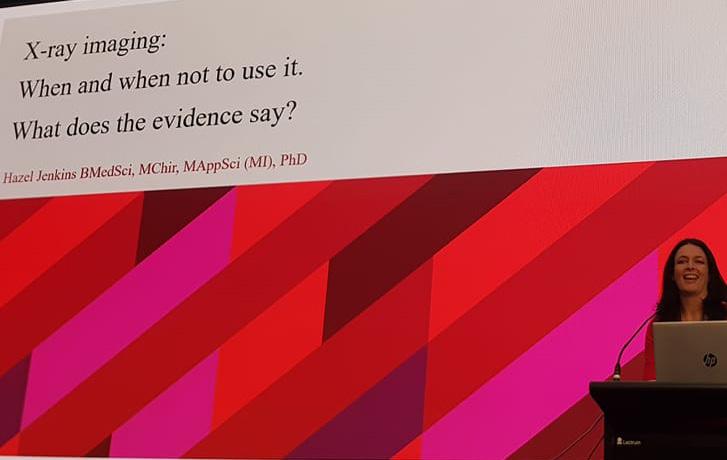
Immediately prior to the break for lunch Mr Christopher Daniel, the Program Lead of the Choosing Wisely Australia program, gave his presentation “Choosing Wisely and Chiropractic Australia”. Choosing Wisely is “A national initiative which enables clinicians, consumers and healthcare stakeholders to start important conversations about tests, treatments and procedures where evidence shows they provide no benefit, or in some cases, lead to harm”. Chiropractic Australia is now a member of Choosing Wisely and is asking its members to reflect on avoiding low value clinical activities in their day-to-day practice.
Immediately following lunch Associate Professor Peter Tuchin discussed “How to create and run a successful evidence-based practice” by detailing the four components for practice success; patient management, practice management, business management, and financial management.
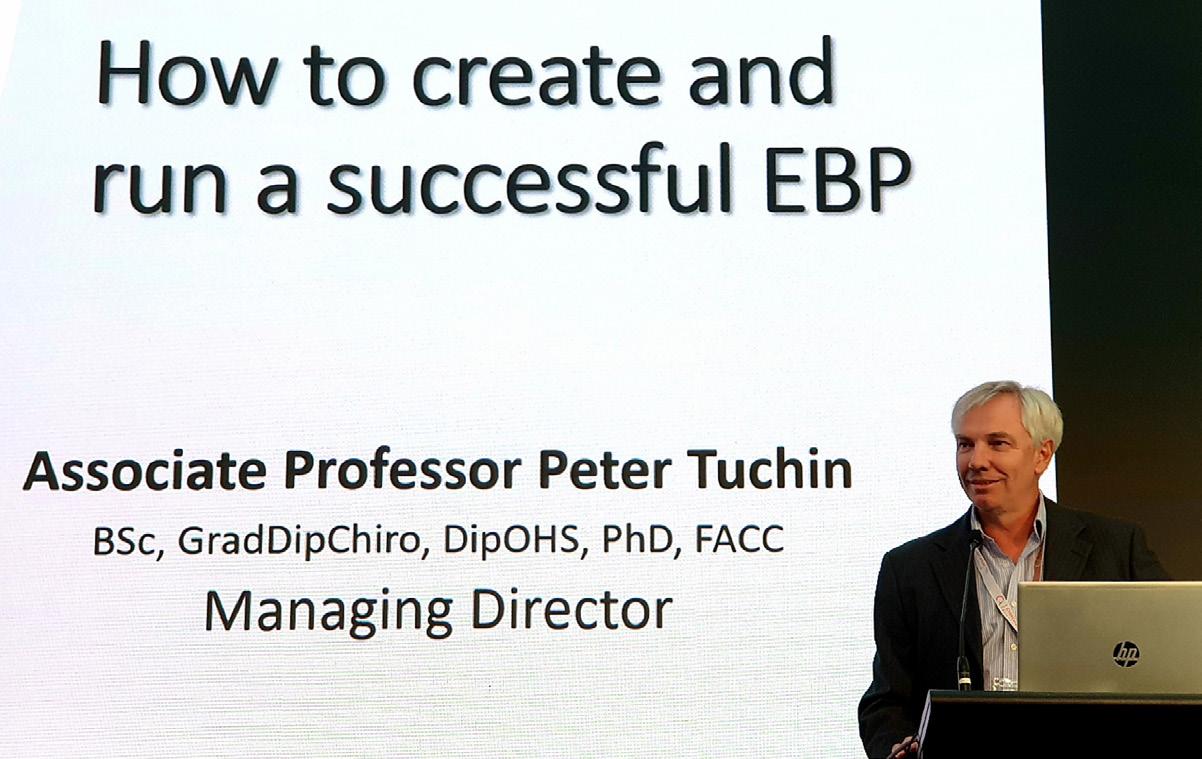
Our third international guest, Dr Bobby Maybee from Portland, Oregon gave a very insightful presentation on embracing the future through “Gamification of Rehabilitation”. Gamification is the application of games into rehabilitation activities which are generally viewed by patients as having little to do with games or fun. The intent of gamification is to motivate patient behaviours by making the rehabilitation process more enjoyable. However, it is not only about making rehab fun but also improving patient outcomes and Dr Maybee urged the audience to adopt a creative, goal orientated, game approach to rehabilitation.
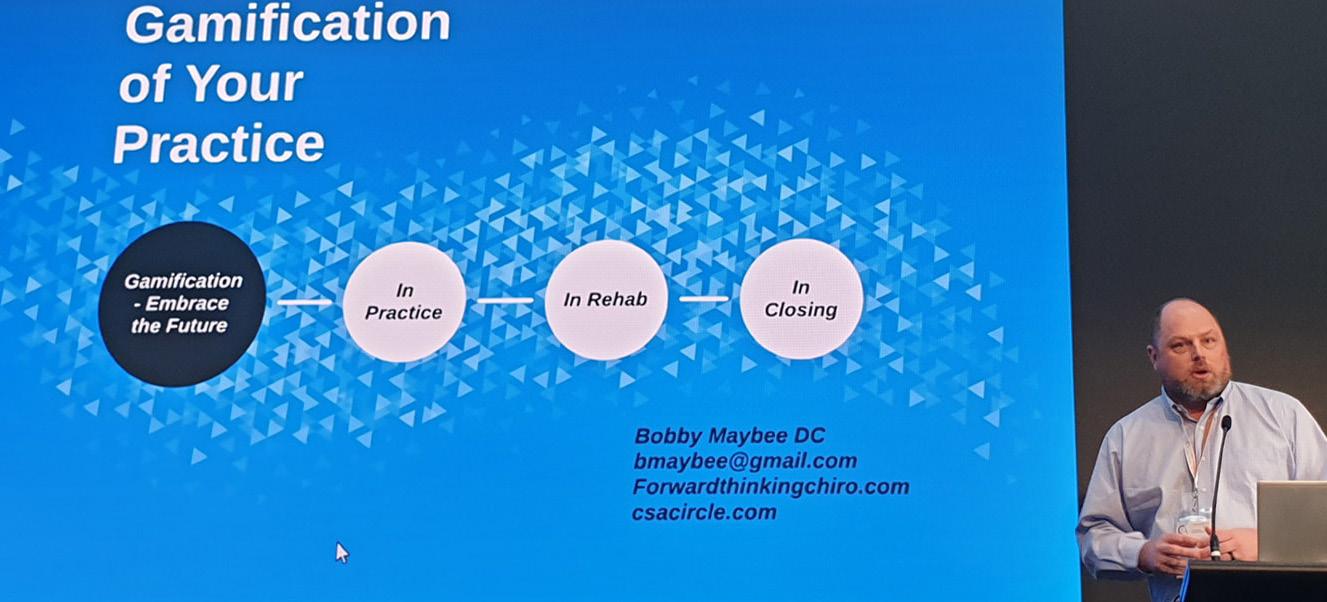
Returning to the stage for his second presentation of the day Professor Stephen Perle addressed the topic “Management of spinal conditions. Is it time for primary spine care practitioners?” in which he emphasised that while chiropractors have the necessary skill set along with a wide range of understanding of spinal care, we need to find ways to improve our public health perspective.
The final session of the day was the exploration of “Chiropractic’s role as a member of a team managing MSK conditions” by a knowledgeable panel comprising Stephen Perle, Dave Newell, Bobby Maybee, Dawn Dane and Peter Tuchin.
Formal conference proceedings on Sunday morning were preceded by the inaugural Women@CA breakfast event, organised by Dr Katie de Luca, which aims to support women in chiropractic research and to establish a community of likeminded researchers with a vision to decrease gender inequity in academia. This was followed by a presentation from the Chiropractic Board of Australia in which board member Dr Michael Badham covered the changes to CPD requirements for chiropractors which come into force on 1st December.
On the Sunday Dr Andrew Shephard continued to discuss ways to use technology in practice in his presentation “Leveraging technology in modern practice: Working smarter not harder”. He showed how much technology has changed and introduced us to a wide range of digital aids such as practice management systems, electronic health records, online accounting systems, and clinical apps such as Physitrack.
Professor Dave Newell added to this technological evolution in his presentation entitled ”Going to the Proms” in which he discussed the impact of the routine collection of patient reported outcomes in practice and encouraged us to use a PROM system (its free folks!). The PROMs allow a practitioner to assess and follow up a patient’s clinical progress. He suggested it could soon become the norm.
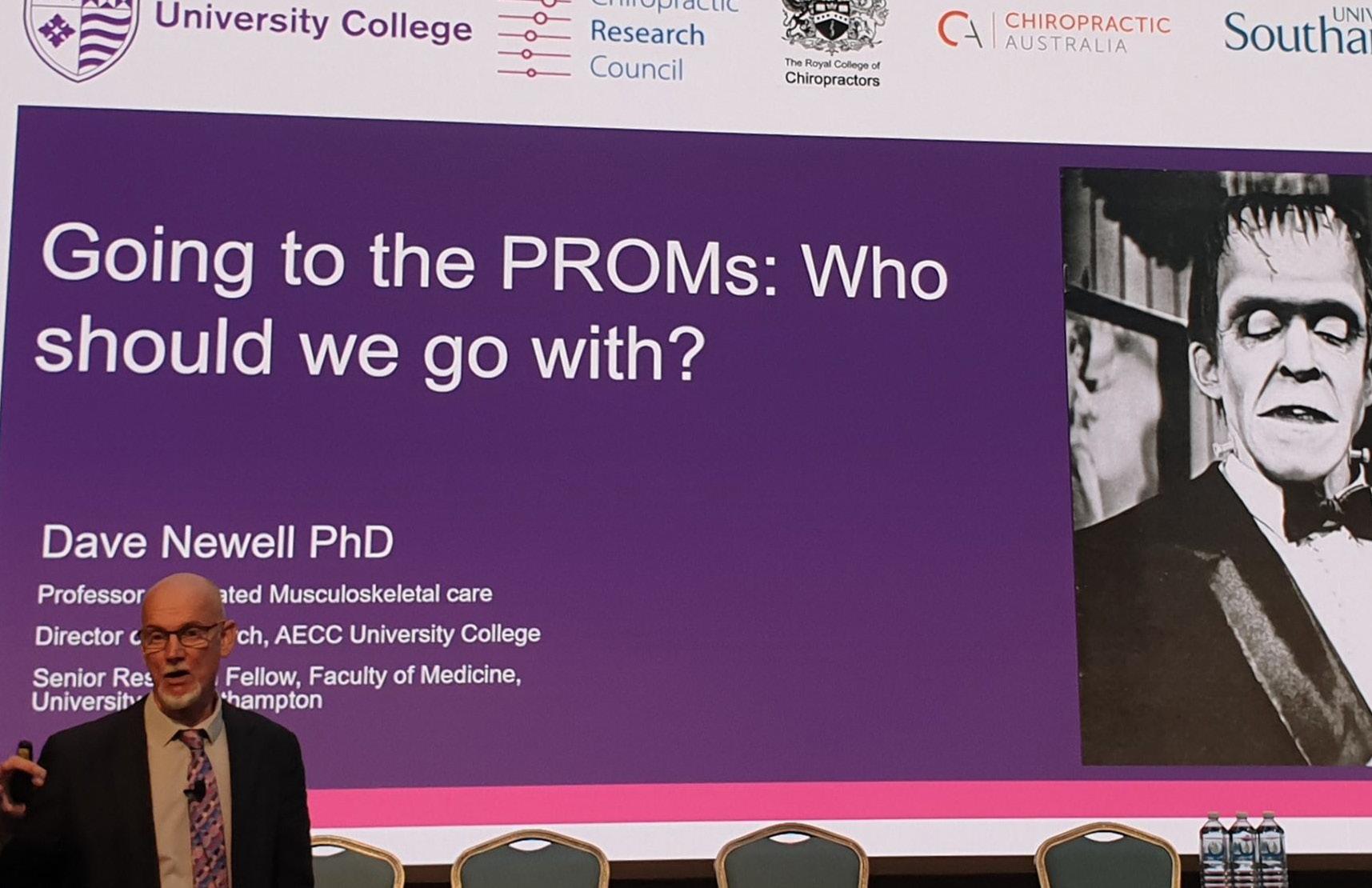
Dr Bobby Maybee’s second presentation “Foundations of ethical approaches to effective marketing” went through the steps needed to put you on the path to success. A fantastic presentation on how to ethically build up your presence and then importantly, maintain your presence.
While Bobby Maybee’s presentation was very much about how social media is an essential tool for chiropractors to promote their practice, the next speaker, Dr Matthew Bulman, offered a far more cautionary view during his presentation “Social media for Australian Chiropractors and Osteopaths: Friends or Foe?” He discussed the dangers surrounding social media and its powerful impact on individuals and society as a whole. He also provided evidence on how data collection and the use of algorithms is used to influence behaviours. Disconcertingly he felt social media stood at odds with our AHPRA obligations.
The final individual presentation of the conference was given by Dr Sasha Aspinall and her topic was “Behind the crack! A modern explanation for spinal manipulation”. She reviewed the science around SMT and what that means for how we use and explain spinal manipulation in our practices.
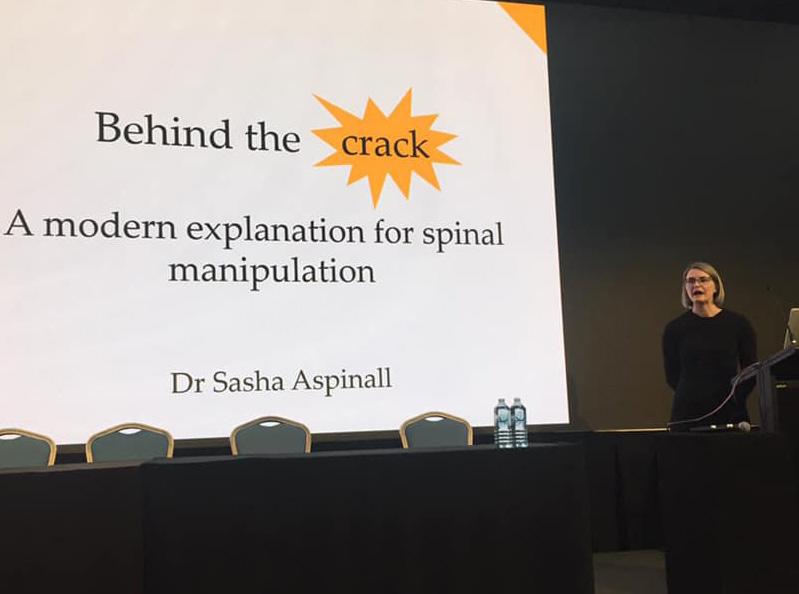
The conference wrapped up with a panel comprising Professor Stephen Perle and Drs Bobby Maybee, Andrew Shepherd, Estee Lombard and Adrian Sheridan discussing “The business of evidence-based practice”.
Special mention should also be made that CA President Rod Bonello was awarded life member of Chiropractic Australia in part for his tireless work in establishing CA and pushing it forward. Responding to this achievement and in typically self-effacingly style he said, “This to me is not a big deal, I feel we just need to give back”. Congratulations to Rod!
Overall, an excellent weekend in an outstanding venue. A range of insights were gained from the variety of local and overseas presenters with many delegates calling it the best Chiropractic Australia conference so far. Until next time, that’s a wrap.





